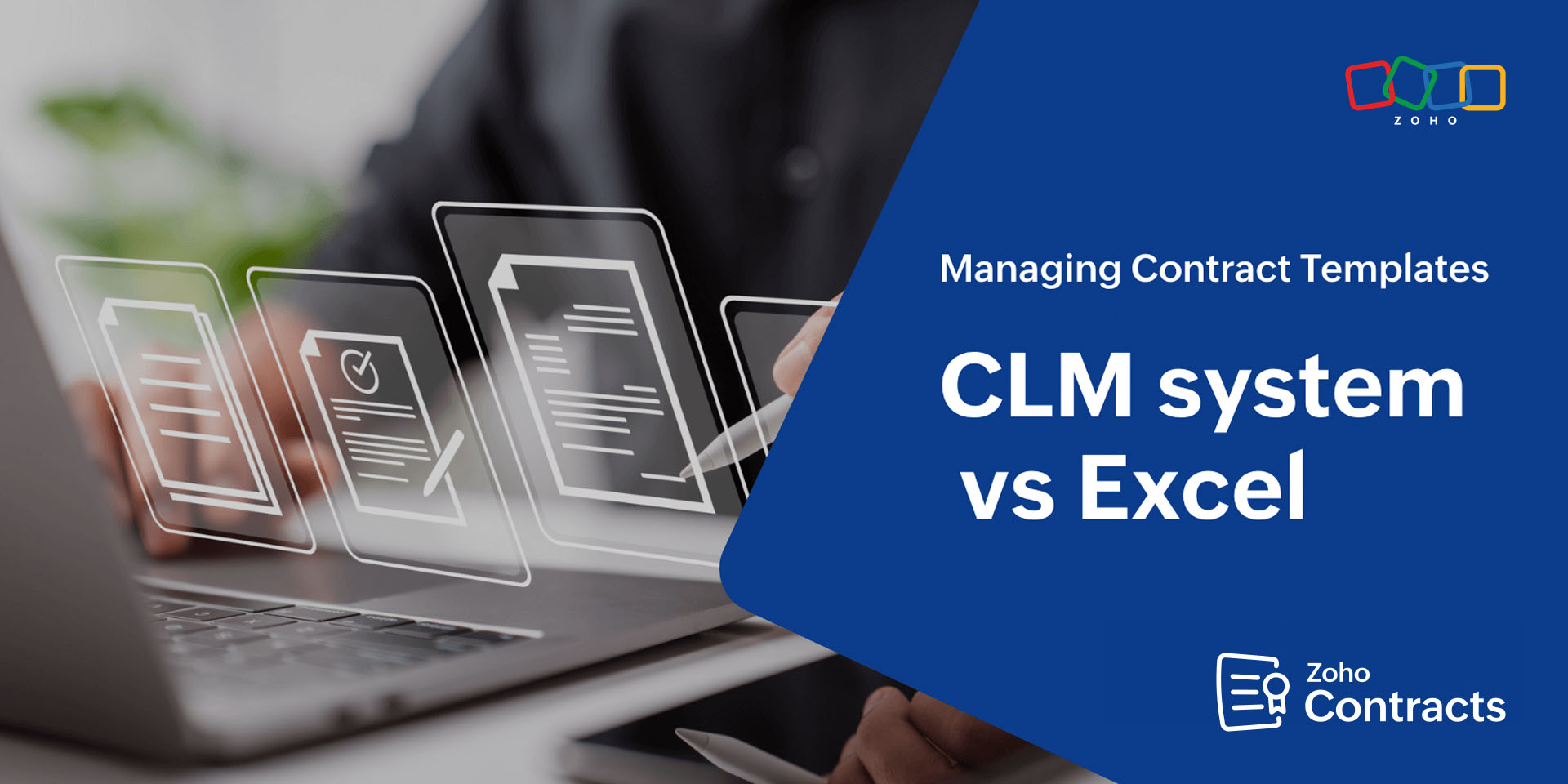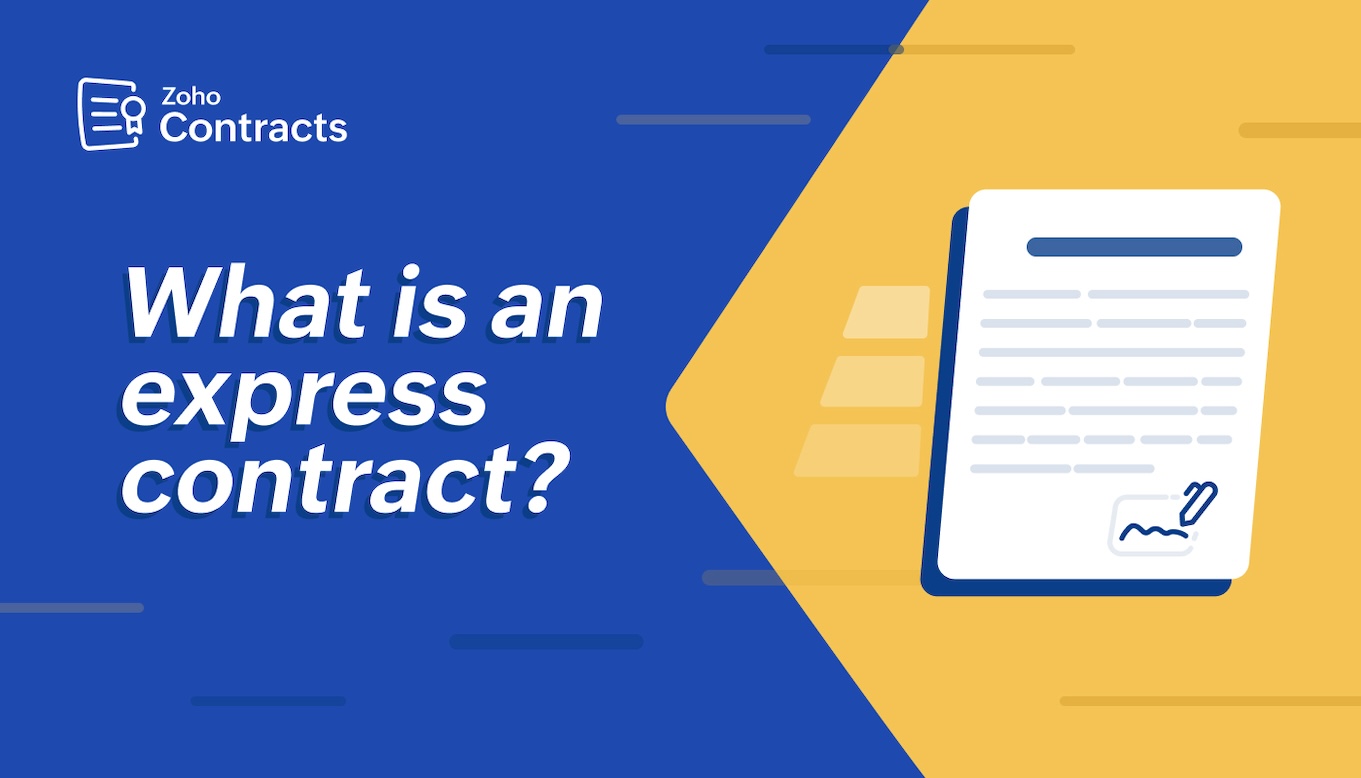- HOME
- Contract Management
- Managing contract templates in a CLM system vs Excel
Managing contract templates in a CLM system vs Excel
- Last Updated : December 6, 2023
- 976 Views
- 4 Min Read

What is a contract template?
A contract template is an arrangement of standard clauses tailored to suit a particular contract type or transaction. Pre-approved contract templates allow contract authors to quickly draft a contract by adding required details and modifying clauses to serve their current engagement.
Why do businesses need a CLM solution for managing contract templates?
In general, managers hold a set of contract templates for commonly used contract types. Traditionally, these templates are managed across disparate systems such as shared drives and spreadsheets. This manual, disconnected approach introduces the following operational challenges:
Contract templates are hard to locate with no central storage.
Conducting periodic checks for outdated clause languages is cumbersome.
Nonrestricted access permissions lead to multiple versions of templates.
Tracking language deviations from the standard contract language is difficult.
These inefficiencies increase the chances of errors, exposing the contracts to risks and performance degradation. With poorly-drafted contracts, businesses face costly litigation, broken relationships, and reputational damage.
The above challenges could be removed with a sophisticated contract lifecycle management (CLM) solution that helps businesses efficiently manage templates, accelerate contract authoring, and improve performance. A digital CLM solution in your legal tech stack empowers teams with predefined templates and a clause library with standard languages. The centralized templates and clause library assures quick reusability and supports scalability. It also allows contract owners to create as many custom contract types as they want.
Managing contract templates in CLM - The benefits
Accelerates contract authoring
Storing and managing standard contract templates for commonly requested contract types eliminates the need to create a contract from scratch each time. These prefabricated templates help contract owners quickly fill in relevant information, modify contract clauses, and draft a contract that suits their current engagement. The standardized templates and self-serve capabilities promote faster contract authoring with reduced chances of errors and operational costs. The prime benefit of managing the templates in a CLM is the controlled access permission that ensures your template library stays the single source of truth for the acceptable languages in your organization.
Ensures language consistency across all contracts
By leveraging the power of templates and the clause library, a CLM solution allows admins to periodically check and update languages in the templates to the latest industry standards. Using these time-tested and authorized contract templates, contract owners can ensure language consistency across all contracts they create. Without pre-approved templates, contract owners are likely to misstate the terms and end up with contracts that don’t serve their best interests. Tracking deviations from standard contract language would be nearly impossible, too.
Reduces legal dependency and costs
Depending on a deal's nature and requirements, users from other departments (for example, sales or procurement) may be required to make changes to the contract draft. In such instances, a central library with legally approved clause languages helps users without legal expertise draft acceptable contracts. This reduces legal dependency and leaves legal teams more time to focus on high-value tasks.
Speeds up revision and approval rate
Building custom contract templates involving C-level leaders can result in templates with acceptable language. Using these risk-proof templates naturally reduces the review time for contracts. With the collaboration and peer-review capabilities of a CLM solution, stakeholders can further reduce errors and help achieve a better version of the contract. Shorter approval cycle times translate to faster revenue recognition and increased performance.
Simplifies introducing organization-wide policy changes
The current business landscape is in constant flux, with frequent regulatory updates and policy changes. When regulations crop up, they would demand alterations to some clause languages that would affect multiple contracts in an organization. During such instances, the standard templates and clause library in a CLM solution allow businesses to quickly assess the impact of these changes and make the required alterations to specific languages. Introducing organization-wide changes at the contract template level ensures critical information is internalized and contextually reflected in all future contracts. Regularly updating contract templates to the latest industry-standard improves compliance, too.
Contract templates and document assembly in Zoho Contracts
Zoho Contracts offers 14 pre-built contract templates, an extensive clause library, and the ability to create as many custom contract templates as required. It also promotes advanced document assembly and real-time collaboration capabilities. The advanced document assembly feature enables you to select and switch between alternative clause languages under the same clause. This eliminates duplication of contract templates for minor tweaks in the language based on geography or other specifics.
Simplifying the contract authoring process with a CLM solution improves speed to market, minimizes costs, and maximizes contract performance. Learn more about streamlining your authoring process using Zoho Contracts.
 Heleena
HeleenaHeleena is a writer based in Chennai, India.


